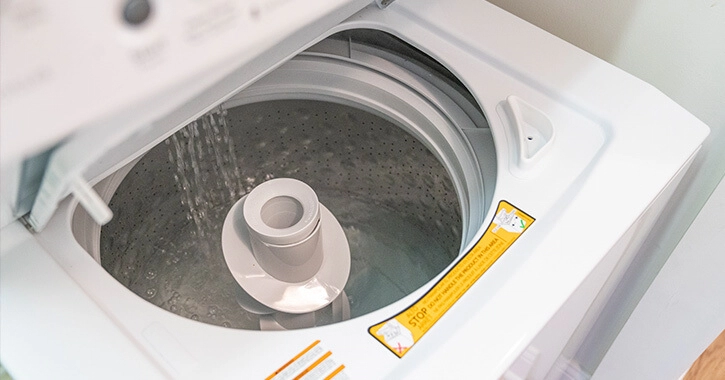To know if the washing machine pump is broken, check for leaks underneath the machine and listen for unusual noises during operation. A malfunctioning pump can cause water not to drain properly and may lead to excessive vibrations.
A washing machine pump plays a vital role in removing water from the appliance, ensuring proper functioning. If you suspect a pump issue, it’s important to address it promptly to avoid further damage to your machine. We will explore common signs of a broken washing machine pump and provide tips on troubleshooting and resolving this issue.
By knowing the symptoms and potential causes, you can effectively diagnose and repair your washing machine pump to keep your appliance running smoothly. Let’s check this guide to ensure your washing machine is operating efficiently.

Credit: www.mrappliance.com
Table of Contents
Signs Of A Broken Washing Machine Pump
If your washing machine is not draining properly, making strange noises, leaking water, or showing visible damage, it might be a sign of a broken washing machine pump. Recognizing these signs early can save you from a potential laundry disaster. Let’s dive into the specific signs that indicate a malfunctioning washing machine pump.
No Water Draining
A primary sign of a broken washing machine pump is when it fails to drain water properly after a wash cycle. If you notice standing water in the drum at the end of a cycle, it could indicate a malfunctioning pump. This issue may also result in clothes being excessively wet at the end of the cycle, signaling a problem with the pump’s ability to remove water effectively.
Strange Noises
Unusual noises during the wash or spin cycle, such as grinding, buzzing, or whirring sounds, can indicate underlying issues, including a malfunctioning pump. Be attentive to any abnormal sounds coming from the washing machine as it could be a hint that the pump is not functioning as it should.
Leaking Water
Water leaking from the front, sides, or bottom of the washing machine could be a sign of a faulty pump. Check the area around the washing machine for any signs of water pooling or dripping during the wash cycle as this could indicate a problem with the pump and its ability to contain water properly.
Visible Damage To The Pump
Inspect the washing machine pump for any visible signs of damage, such as cracks, corrosion, or broken parts. Visible physical damage can directly impact the pump’s performance and lead to issues with water drainage and overall functionality.
Causes Of A Broken Washing Machine Pump
Check the headings and details below to find whether your washing machine’ pump is broken or not:
Clogs And Blockages
A common cause of a broken washing machine pump is the presence of clogs or blockages that obstruct the normal flow of water.
Worn Out Bearings
Worn out bearings can lead to a malfunctioning washing machine pump, causing it to not function properly.
Faulty Motor
A faulty motor can also contribute to a broken washing machine pump, affecting its ability to pump water effectively.
Excessive Use And Age
With excessive use and age, a washing machine pump may deteriorate, leading to potential breakdowns.
Steps To Check For A Broken Washing Machine Pump
Follow the below-
Check For Water Drainage Issues
Run a wash cycle and observe if the water is draining properly.
Listen For Unusual Noises
Pay attention to any strange sounds coming from the washing machine during operation.
Inspect For Water Leaks
Check around the washing machine for any signs of moisture or water leakage.
Look For Visible Damage On The Pump
Examine the washing machine pump for any cracks, rust, or physical damage.
:max_bytes(150000):strip_icc()/washing-machine-wont-drain-2718776-hero-2441a4ba9ea04f9daa3b8662ae75c624.jpg)
Credit: www.thespruce.com
How To Troubleshoot A Broken Washing Machine Pump
When your washing machine pump is malfunctioning, it can lead to serious disruptions in your laundry routine. To troubleshoot a broken washing machine pump, it’s important to pinpoint the specific issue and take appropriate steps to rectify the problem.
Clearing Clogs And Blockages
If your washing machine pump is not working properly, it may be due to clogs and blockages obstructing the flow of water. You can troubleshoot this issue by inspecting the pump’s inlet and outlet for any debris or obstruction. If clogs are present, carefully remove them to restore proper water flow.
Replacing Worn Out Bearings
One common cause of a malfunctioning washing machine pump is worn-out bearings. You can troubleshoot this issue by examining the pump’s bearings for signs of wear and tear. If the bearings are worn, they will need to be replaced to ensure the pump functions optimally.
Repairing Or Replacing Faulty Motor
If your washing machine pump’s motor is faulty, this can impede its operation. To troubleshoot this issue, carefully inspect the motor for any signs of damage or malfunction. Depending on the severity of the issue, you may need to either repair the motor or replace it with a new one.
Considering Replacement For Old Pumps
Older washing machine pumps may reach a point where they are no longer salvageable. If troubleshooting efforts prove futile, it may be time to consider replacing the old pump with a new, more efficient model. By upgrading to a newer pump, you can ensure that your washing machine operates at its best.
Preventive Maintenance For Washing Machine Pumps
To identify a faulty washing machine pump, check for water not draining, unusual noises, or leaks during operation. A drop in cleaning performance or foul odors may also indicate pump problems. Regular preventive maintenance can help avoid costly repairs.
Regular Cleaning And Maintenance
Regular cleaning and maintenance are essential to ensure the smooth functioning of your washing machine pump. By following a few simple steps, you can prevent potential breakdowns and costly repairs.
- Keep the exterior of your washing machine clean by wiping it down regularly with a damp cloth.
- Inspect the hoses and connections for any signs of wear or leakage. Replace them if necessary.
- Ensure the area around the washing machine is free from dust and debris.
- Check the leveling of your machine to prevent vibrations and excessive wear on the pump.
Avoid Overloading The Machine
Overloading your washing machine can put excessive strain on the pump, leading to its breakdown. Follow these tips to prevent overloading:
- Read the manufacturer’s guidelines for load capacity and adhere to them.
- Divide large loads into smaller ones to ensure even distribution of weight.
- Do not stuff the machine with clothes as it can obstruct the pump’s operation.
- Avoid washing heavy items, such as blankets or rugs, regularly.
Check And Clean Pump Filter
The pump filter plays a crucial role in preventing debris from clogging the pump. Follow these steps to check and clean the pump filter:
- Locate the pump filter, typically found at the front or bottom of the machine.
- Place a tray or towel beneath the filter area to catch any water that might spill.
- Turn the filter counterclockwise to remove it.
- Carefully clean the filter by rinsing it with water to remove any trapped debris.
- Ensure the filter is securely tightened back into place.
Professional Inspection And Servicing
Regular professional inspection and servicing can help identify potential issues with your washing machine pump before they turn into major problems. Consider the following:
- Schedule annual or bi-annual inspections with a qualified technician.
- During servicing, the technician will check the condition of the pump and its components.
- Any signs of wear or malfunction will be addressed promptly, preventing further damage.
- Professional servicing will extend the lifespan of your washing machine and ensure optimal performance.
Cost Of Repairing Or Replacing A Washing Machine Pump
If your washing machine fails to drain, it may signal a broken pump. The cost to repair or replace a washing machine pump averages between $150 to $300. Look out for water pooling under the machine as a sign of pump malfunction.
Factors Affecting Cost
A variety of factors can affect the cost of repairing or replacing a washing machine pump. It’s essential to consider these factors before making a decision.
- The type of pump: Different washing machine models may use different types of pumps, such as direct-drive pumps or belt-drive pumps. The cost of repairing or replacing these pumps may vary.
- Brand and model: The brand and model of your washing machine can also impact the cost. Some brands or models may have more expensive pumps or require specialized parts.
- Age of the machine: Older machines may be more expensive to repair due to the availability of spare parts or the need for more labor-intensive repairs.
- Extent of the damage: The severity of the pump’s damage will play a role in the overall cost. Minor repairs may be more affordable, while extensive damage may require a complete pump replacement.
Do-it-yourself Vs Professional Repair
Deciding whether to repair the pump yourself or hire a professional can significantly impact the cost of fixing your washing machine pump.
If you have experience with appliance repairs and access to the necessary tools, attempting a DIY repair may save you money. However, it’s important to note that washing machine repairs can be complex, and any mistakes could lead to further damage or safety hazards.
On the other hand, hiring a professional ensures that the repair is done correctly, with the guarantee of quality workmanship. While professional repairs may cost more upfront, they can prevent additional expenses in the long run.
Price Range For Pump Replacement
The cost of replacing a washing machine pump can vary depending on several factors, including the brand and model of your machine, the type of pump required, and the labor charges of the repair service.
Type of Pump | Price Range |
|---|---|
Belt-drive pump | $50 – $150 |
Direct-drive pump | $100 – $300 |
Specialized or high-end pump | $200 – $500 |
Additional Costs To Consider
When calculating the cost of repairing or replacing your washing machine pump, it’s important to consider any additional costs that may arise.
- Labor charges: If you opt for professional repair services, labor charges may be added to the total cost of the pump replacement or repair.
- Spare parts: Depending on the extent of the damage, additional spare parts may be required to complete the repair or replacement.
- Service fees: Some repair companies may charge a service fee to cover their travel expenses or consultation fees.
- Warranty or guarantee: If your washing machine is still under warranty, the cost of repair or replacement may be covered, reducing your out-of-pocket expenses.
By considering these additional costs, you can accurately estimate the total investment required to fix your washing machine pump.
When To Call A Professional For Help
When you notice problems with your washing machine pump, it’s important to assess whether you should call a professional for assistance. While some issues can be resolved with basic troubleshooting, certain situations may require the expertise of a skilled technician.
Here are some scenarios where it’s best to seek professional help:
Lack Of Technical Expertise
If you lack experience with appliance repairs and are unsure about the complexity of the issue, it’s prudent to enlist the help of a professional. Attempting repairs without the necessary knowledge could potentially exacerbate the problem and lead to further damage.
Safety Concerns
When dealing with mechanical and electrical components, safety should be a primary concern. If you are uncertain about how to safely diagnose and address issues related to the washing machine pump, it’s best to avoid potential hazards and seek assistance from a professional.
Complex Repairs And Replacements
Instances, where the repair or replacement of the washing machine pump involves intricate procedures or specialized tools, may necessitate the expertise of a professional technician. These complex tasks are best handled by individuals with the requisite skills and resources to ensure effective resolution.
Manufacturer Warranty And Support
Seeking professional assistance can also be beneficial in safeguarding the terms of the manufacturer’s warranty. Certified technicians are adept at performing repairs and replacements in compliance with warranty provisions, ensuring that your appliance remains covered and supported by the manufacturer.
FAQ
How Do You Know If Washing Machine Pump Is Broken?
A broken washing machine pump may cause water to leak, the machine to make unusual noises, or the clothes to not be properly washed. Check for any signs of water leakage or unusual noises coming from the machine during operation.
If your clothes are not being thoroughly cleaned or there is water pooling in the tub, there is a possibility that the pump is broken.
What Are The Common Signs Of A Broken Washing Machine Pump?
Common signs of a broken washing machine pump include water leakage, unusual noises during operation, and clothes not being properly washed. If you notice any of these signs, it is important to inspect and possibly replace the pump to ensure proper functioning of your washing machine.
How Can I Confirm If My Washing Machine Pump Is Indeed Broken?
To confirm if your washing machine pump is broken, you can perform a few troubleshooting steps. Check for any signs of water leakage, inspect the pump for any physical damage or blockages, and listen for any unusual noises during operation.
If these indicators point towards a faulty pump, it is recommended to contact a professional for further inspection and repair.
Final Words
A malfunctioning washing machine pump can cause various problems, from water drainage issues to leaks. Regular maintenance and prompt repairs can help prolong the life of your washing machine. If you notice any unusual noises, slow drainage, or water leaks, it’s important to have the pump inspected and repaired by a professional.



